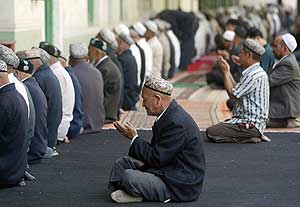|
CHINA RELEASES 'TERROR'
BLACKLIST OF UYGHURS
2003-12-19
RFA
Call for cooperation coincides
with Saddam Hussein capture

Muslim
Uyghurs at afternoon prayer at the Idkah Mosque in
Kashgar, in northwest China's Xinjiang province,
earlier this year. AFP PHOTO
China has released a list
of individuals and groups campaigning for independence
for the northwestern Muslim region of the country that
it designates terrorist organizations, calling on the
international community for cooperation against them,
RFA reports.
Beijing's announcement came just one day after the
United States announced the capture of the ousted
Iraqi leader, Saddam Hussein. Foreign ministry
spokesman Liu Jianchao repeated the call for
international assistance against Uyghur independence
organizations on Tuesday.
"The Chinese government hopes that the international
community will support China's efforts to combat
terrorism," Liu told a regular Foreign Ministry
briefing. "And it calls on all governments, especially
law enforcement agencies, to take legal action against
those organizations which China has determined as
terrorist organizations, to ban their activities in
their territories, forbid support, financing and
harboring of these organizations and to freeze their
assets," he said.
Liu said that China wanted to step up its
international cooperation on the fight against
terrorism, including cooperation through diplomatic,
intelligence, and military channels, but he stopped
short of saying whether Beijing would request the
extradition of those it had named terrorists.
China's Ministry of Public Security on Monday named
four groups campaigning for self-rule in the
northwestern region of Xinjiang, which Uyghur
activists refer to as East Turkestan.
"They have planned, organized, and carried out a
series of violent terrorist activities such as
bombings, assassinations, arsons, poisonings, and
attacks," Zhao Yongchen, deputy chief of the
ministry's anti-terror bureau, said in a statement.
He called on the international community to ban the
groups, stop them from getting support or asylum,
freeze their accounts, and prosecute wanted
individuals and extradite them to China.
One of the organizations was the East Turkestan
Information Center (ETIC), which runs prominent news
Web site on Uyghur affairs. The other three were named
as the East Turkestan Islamic Movement (ETIM), East
Turkestan Liberation Organization (ETLO), and World
Uyghur Youth Congress (WUYC).
The bureau also named: Hasan Mahsum; Muhanmetemin
Hazret; Dolqun Isa; Abudujelili Kalakash; Abudukadir
Yapuquan; Abudumijit Muhammatkelim; Abudula Kariaji;
Abulimit Turxun; Huadaberdi Haxerbik; Yasen Muhammat;
and Atahan Abuduhani.
It accused ETIC of secretly sending information on how
to conduct violent terrorist activities back to a
network within the Chinese border, and claimed it was
using its information role as a facade for these
activities.
"The ETIC openly advertises religious extremist ideas
in articles it published, including 'Is There Hope for
Our Independence' and 'To Win Independence or to
Die'," Zhao said, adding that the organization had
called on Muslims in Chinese territory to employ
explosives and poisons in attacks on kindergartens and
schools of the ethnic Han population and government
establishments, and to attack Chinese armed forces.
The Germany-based ETIC English-language Web site
carried reports of China's announcement, including a
reaction from its own spokesman. Dilxat Raxit denied
any involvement in violence.
"China's anti-terrorism activities cannot be believed,"
Raxit was quoted as saying. "We hope that Western
countries don't fall into the trap set by the Chinese
government."
Raxit said ETIC was being targeted "because we have
been exposing the negative side of the Chinese
government." He said China often blames unsolved
crimes on the Uyghur ethnic group in Xinjiang. Chinese
officials offer little evidence of an organized
campaign or of foreign links. Authorities in Xinjiang
have told foreign reporters the territory has little
separatist violence.
"A lot of people sort of feel that they are using the
threat of terrorism to strengthen their control of the
region," said Dru Gladney, a specialist on Xinjiang at
the University of Hawaii, quoted by AP.
Much of the evidence cited by China was obtained in
confessions from suspected operatives, and "we know
that China can be very harsh in its treatment of
prisoners," Gladney said.
In a recent testimony aired by RFA's Uyghur service
after his execution in China, Uyghur independence
activist Shirali detailed a litany of torture and
abuse at the hands of Chinese prison guards and
interrogators. Shirali was accused of membership of
ETIM, which was blacklisted by the United States and
the United Nations as a terrorist organization after
the Sept. 11, 2001 terror attacks.
Uyghurs constitute a distinct, Turkic-speaking, Muslim
minority in northwestern China and Central Asia. They
declared a short-lived East Turkestan Republic in
Xinjiang in the late 1940s but have remained under
Beijing's control since 1949.
According to a Chinese Government white paper, in 1998
Xinjiang comprised 8 million Uyghurs, 2.5 million
other ethnic minorities, and 6.4 million Han
Chinese-up from 300,000 Han in 1949. Most Uyghurs are
poor farmers, and at least 25 percent are illiterate.
Copyright © 2001-2003 Radio Free Asia. All Rights
Reserved.
|



